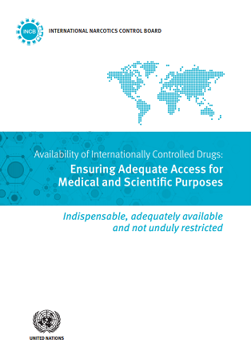 The International Narcotics Control Board (INCB) released
its report Availability
of Internationally Controlled Drugs: Ensuring Adequate Access for Medical and
Scientific Purposes last Thursday, 4 February 2016. The report updates its 2010
report on the same topic.
The International Narcotics Control Board (INCB) released
its report Availability
of Internationally Controlled Drugs: Ensuring Adequate Access for Medical and
Scientific Purposes last Thursday, 4 February 2016. The report updates its 2010
report on the same topic.
The new report highlights disparities between high- and low/middle-income
countries in availability of and access to controlled medicines, including opioids
for the relief of pain from cancer, and contains a number of important recommendations
to address barriers to availability and access.
The INCB is the body responsible for monitoring
implementation of the Single Convention on Narcotic Drugs, the key
international instrument regulating controlled medicines, including opioid
analgesics. The Single Convention recognises that “the medical use of narcotic
drugs continues to be indispensable for the relief of pain and suffering and
that adequate provision must be made to ensure the availability of narcotic
drugs for such purposes”. However, in many countries, excessive focus on the
Single Convention’s other aim – preventing diversion and abuse of narcotic
drugs – has led to severe barriers to the availability of opioid analgesics for
pain relief and palliation.
The report states that 5.5 billion people have ‘limited or
no access to medicines containing narcotic drugs’, and that 92% of the world’s
medical morphine is consumed in a small number of high-income countries constituting only 17% of the world’s population, predominantly the US, Canada, countries in Western Europe,
Australia and New Zealand. The remaining 83% of the
world’s population, predominantly low and middle-income countries, consumes only 8% of the world’s medical morphine. The World
Health Organization estimates that each year, 5.5 million terminal cancer
patients suffer from moderate to severe pain that is not managed at all. These
disparities persist despite global stocks of opiate raw materials that are
sufficient to meet global demand.
Barriers to availability and access identified by the INCB through
a survey of Single Convention member states include lack of training or
awareness among health professionals, fear of addiction, limited financial
resources, problems in sourcing from industry or imports, cultural and social
attitudes toward the treatment of pain, fear of diversion into illicit
channels, fear of prosecution or sanction, international trade control
measures, and onerous regulations. Of these, legal barriers highlighted by the
INCB include fear of sanctions due to unclear or punitive laws that discourage
prescribing or stocking opioids; restrictions on who can dispense and prescribe
opioids; limits on dosage amounts or on how long a prescription is valid for;
requirements for special patient permits; burdensome bureaucratic and reporting
requirements; and disproportionate penalties including penalties for
unintentional violations.
The report aims to provide guidance on addressing these
barriers. It emphasises that access to controlled drugs for medical purposes is
a human right, and reinforces that parties have obligations under the Single
Convention not only to prevent diversion and abuse, but to ensure adequate and
not unduly restricted availability of internationally controlled drugs for
medical purposes. It recognises that opioid analgesics are indispensable for
cancer treatment and palliation. The problem is especially urgent in low- and
middle-income countries, which currently account for 70% of cancer deaths – a
proportion that is projected to increase further by 2030 without sustained
action.
The report makes a number of recommendations, including in
relation to legislation and regulatory systems, health systems, affordability,
training of health care professionals, public education and awareness. Legal
recommendations include reviewing laws and regulations to streamline
distribution and prescribing processes, removing legal sanctions for
unintentional mistakes in handling opioids, broadening prescription validity
periods and the classes of professionals who are able to prescribe, improving
interagency cooperation, and providing the health and pharmaceutical community
with updated information on laws and administrative measures.
The report is another important step in the global move to ensure
that access for medical and scientific purposes receives the prominence it
deserves within the international drug control regime. These steps began with Commission
on Narcotic Drugs (CND) resolutions in 2010 and 2011, and have continued with decisions
and reports from the CND, UN Office of Drugs and Crime, INCB, World Health
Assembly and WHO. They complement the growing recognition of the importance of palliative
care in global health fora, including the World Health Assembly’s 2014
resolution on access to palliative care, and the inclusion of an indicator for
access to palliative care in the Global Monitoring Framework for Non-Communicable
Diseases. In April 2016, the UN General Assembly will hold a Special Session on
the World Drug Problem (UNGASS), which will cover a wide range of drug policy issues
including the availability of controlled medicines, prevention and treatment of
drug dependence, HIV/AIDS, alternative development, and judicial cooperation. UNGASS represents a critical opportunity to guide
international drug policy and national activities to address the lack of
availability of opioid analgesics and other controlled medicines.
Download
the report
Read about the McCabe Centre’s work on access
to opioid analgesics